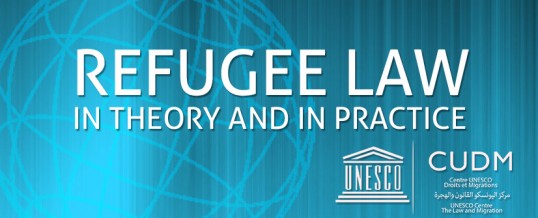
The UNESCO Centre « The Law and Migration » Is organizing a Seminar on Refugee Law in Theory and in Practice, On 27 May 2013, In Rabat at The National Library of the Kingdom of Morocco
Background Note
If both legal scholars and practitioners of refugee law are in general not quite aware of migration law, there are even less aware of refugee law, which is a branch of this law. A lot of confusion is made concerning this law. For example, forced migrants are often considered as irregular migrants and are called also “illegal migrants”, particularly in mixed population flows.
Refugee law needs to be known better and to be promoted, by both scholars and practitioners of Law.
Morocco is part of many instruments relating to human rights, migration law and refugee law. Some stipulations of the new Moroccan Constitution of July 2013 declare that international conventions ratified by Morocco should be applicable directly as domestic law.
The UNESCO Centre “The Law and Migration” has taken as a task to promote migration law and migrants’ rights. The Centre is taking the opportunity of the visit to Morocco of an eminent specialist of refugee law, Professor James Hathaway, to organize a seminar on “Refugee Law in Theory and in Practice” on Monday 27 May from 15 to 18 O’clock, in Rabat, at the National Library of the Kingdom of Morocco.
James Hathaway is a Professor of Law and the Director of the Program in Refugee and Asylum Law at the University of Michigan. He is a leading authority on international refugee law whose work is regularly cited by the most senior courts of the common law world. Professor Hathaway also sits on the editorial boards of the Journal of Refugee Studies and the Immigration and Nationality Law Reports and directs the Refugee Caselaw Site (www.refugeecaselaw.org), a website that collects indexes and publishes leading judgments on refugee law. Professor Hathaway regularly advises and provides training on refugee law to academic, non-governmental, and official audiences around the world.
Morocco is, at present, reforming it legal system. It is worth taking advantage of Professor Hathaway’s presence in Morocco to debate about this reform and to discuss more precisely about the need for reviewing Moroccan law on both voluntary and forced migration. That is why it has been decided to schedule during the same seminar presentations on Moroccan refugee law and also on the practice of the UNHCR Bureau in Rabat.
Thus, the meeting will include presentations on refugee law and the practice in North America as well as on refugee law in Morocco and the practice of UNHCR in the country.
PROGRAMME
15 O’clock Opening
15.30 – 16 O’clock Why Refugee Law?
James Hathaway
Law Professor, Director of the Program in Refugee and Asylum Law at the University of Michigan, USA
16h.30 – 17 h Discussion
17h – 17h. 20 Refugee Law in Morocco
Khadija Elmadmad
Law Professor, Advocate, Director of the UNESCO Centre « The Law and Migration », Rabat
17 h. 20 – 17 h.40 UNHCR and Refugees in Morocco
Leila Jane Nassif
Representative of the United Nations High Commissioner for Refugees (UNHCR) in Morocco, Rabat
17h. 40 – 18 h Discussion
18h Closing
Share